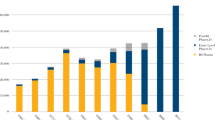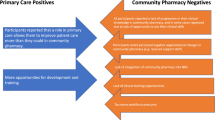Abstract
Transitions of care has emerged as a point of vulnerability in global health care systems, which can lead to potential avoidable medical errors. In the United States, pharmacist-led transitions of care programs are increasing in number, with many hospitals offering discharge prescription services. However, the required training for these positions remains unclear. With the lack of accreditation standards by the American Society of Health-System Pharmacists for transitions of care as a post-graduate year 2 specialty, this leads to the unanswered question: Which pharmacists are qualified for the growing number of transitions of care positions? Whether trained in a formal transitions of care specialty residency or not, pharmacists as a profession should reassess the proper qualifications needed to provide transitions of care services. One central message remains clear in that having a pharmacist on any interdisciplinary team who is knowledgeable about inpatient and community settings and administrative tasks involved in transitions of care while understanding optimal evidence-based recommendations would appear to be an important piece to the puzzle.
Similar content being viewed by others
References
Centers for Medicare and Medicaid Services. Eligible professional meaningful use menu set measures: measure 7 of 9 stage 1. 2014. https://www.cms.gov/Regulations-and-Guidance/Legislation/EHRIncentivePrograms/downloads/8_Transition_of_Care_Summary.pdf
Johnson A, Guirguis E, Grace Y. Preventing medication errors in transitions of care: a patient case approach. J Am Pharm Assoc. 2015;55(2):e264-274.
Aitken M, Gorokhovich L. Advancing the responsible use of medicines: applying Levers for change. IMS Institute for Healthcare Informatics; 2012. https://papers.ssrn.com/sol3/papers.cfm?abstract_id=2222541.Accessed 25 November 2020.
Paulino EI, Bouvy ML, Gastelurrutia MA, Guerreiro M, Buurma H. Drug related problems identified by European community pharmacists in patients discharged from hospital. Pharm World Sci. 2004;26(6):353–60.
Tam VC, Knowles SR, Cornish PL, Fine N, Marchesano R, Etchells EE. Frequency, type and clinical importance of medication history errors at admission to hospital: a systematic review. CMAJ. 2005;173(5):510–5.
Downes JM, O’Neal KS, Miller MJ, Johnson JL, Gildon BL, Weisz MA. Identifying opportunities to improve medication management in transitions of care. Am J Health Syst Pharm. 2015;72(17 Suppl 2):S58-69.
World Health Organization. Medication Safety in Transitions of Care. https://www.who.int/patientsafety/medication-safety/TransitionOfCare.pdf?ua=1. Accessed November 25, 2020.
Coleman EA, Parry C, Chalmers S, Min SJ. The care transitions intervention: results of a randomized controlled trial. Arch Intern Med. 2006;166(17):1822–8.
Jack BW, Chetty VK, Anthony D, Greenwald JL, Sanchez GM, Johnson AE, et al. A reengineered hospital discharge program to decrease rehospitalization: a randomized trial. Ann Intern Med. 2009;150(3):178–88.
Kilcup M, Schultz D, Carlson J, Wilson B. Postdischarge pharmacist medication reconciliation: impact on readmission rates and financial savings. J Am Pharm Assoc. 2013;53(1):78–84.
Kirkham HS, Clark BL, Paynter J, Lewis GH, Duncan I. The effect of a collaborative pharmacist-hospital care transition program on the likelihood of 30-day readmission. Am J Health Syst Pharm. 2014;71(9):739–45.
Pedersen CA, Schneider PJ, Scheckelhoff DJ. ASHP national survey of pharmacy practice in hospital settings: prescribing and transcribing-2016. Am J Health Syst Pharm. 2017;74(17):1336–52.
Boylan PM, Eltaki SM. Post-graduate year two transitions of care pharmacy residencies no longer accredited. Curr Pharm Teach and Learn. 2018;10(5):543–5.
American Society of Health-System Pharmacists. ASHP accreditation standard for postgraduate year two (PGY2) pharmacy residency programs. 2017. https://www.ashp.org/-/media/assets/professional-development/residencies/docs/pgy2-residency-accreditation-standard-June2017.ashx?la=en&hash=FA375984733CEA67F705CB327A635777515EE65E.Accessed 25 November 2020.
American Society of Health-System Pharmacists. ASHP accreditation standard for postgraduate year one (PGY1) pharmacy residency programs. 2016. https://www.ashp.org/-/media/assets/professional-development/residencies/docs/pgy1-residency-accreditation-standard-2016.ashx?la=en&hash=1EC115E4EE6790D5877BD970D655D97D11D368B1. Accessed 25 November 2020.
Joseph T, Hale GM, Eltaki SM, Prados Y, Jones R, Seamon M, Moreau C, Gernant SA. Integration strategies of pharmacists in primary care-based accountable care organizations: a report from the accountable care organization research network, services, and education. J Manag Care Spec Pharm. 2017;23(5):541–8.
Kliethermes MA. Understanding healthcare billing basics. Pharm Today. 2017;23(7):57–68.
Funding
The authors received no financial support for the research, authorship, and/or publication of this article.
Author information
Authors and Affiliations
Corresponding author
Ethics declarations
Conflicts of interest
The authors declared no potential conflicts of interest with respect to the research, authorship, and/or publication of this article.
Additional information
Publisher's Note
Springer Nature remains neutral with regard to jurisdictional claims in published maps and institutional affiliations.
Rights and permissions
About this article
Cite this article
Joseph, T., Hale, G.M. & Moreau, C. Training pharmacy residents as transitions of care specialists: a United States perspective. Int J Clin Pharm 43, 756–758 (2021). https://doi.org/10.1007/s11096-021-01231-4
Received:
Accepted:
Published:
Issue Date:
DOI: https://doi.org/10.1007/s11096-021-01231-4




